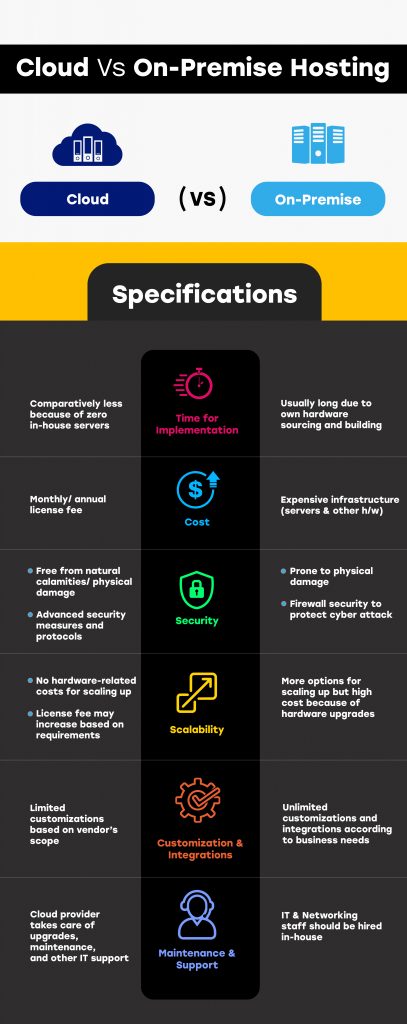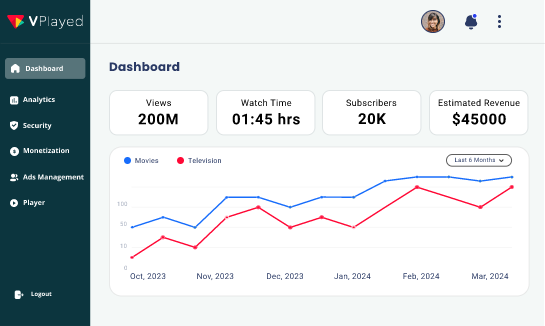Cloud Vs On-Premise Video Hosting: Which Should Businesses Opt for?

Now that you’ve landed on this page, we guess you’re here for some solid advice on which storage and video delivery method to choose for your brand new OTT platforms. But, unlike the conventional talk of how cloud is superior to on-premise servers, we simply jot down what each hosting means and their distinguishing features. Finally, we leave the choice to you to decide on which type of hosting best suits your streaming business.
Table of Contents
A Glimpse of What Video Hosting Is
OTT video hosting typically involves uploading + storing + distribution & delivery of videos via a series of servers, technically referred to as a CDN (Content Delivery Network), on the Internet. Content/ business owners either host their own videos or rely on any 3rd party hosting services to help them broadcast their content to their audiences. Though superficially it may seem less complicated to host your videos through the latter, the benefits of a self-hosted video business are far huge in terms of successful revenue generation and ownership.
Once you’ve decided to go with self-hosting, you as a business owner are left with two options i) On-premise and ii) Cloud.
What is On-Premise Video Hosting?
When it comes to on-premise hosting, you own the physical infrastructure, and the IT staff to handle and maintain the servers and other hardware practically needed for seamless and secure streaming.
The costs involved in setting up their own infrastructure are quite high for businesses considering the fact that the system continually needs to be carefully monitored for proper functioning, and updated for scalability as your content and audience grow in number. However, with on-premise on demand video hosting, you get complete ownership over your platform and the way your videos are stored and distributed.
How Does on-Premise Video Hosting Work?
- In-House Infrastructure
Once you have the infrastructure and the required cooling systems in place, all you need to do is find a suitable VOD solution provider like CONTUS VPlayed to deploy a working software for video hosting and video streaming platform.
- Firewall Security
Next comes security! Investing in a robust firewall is as important as spending on infrastructure. With a good defense system, there is little chance of cyberattacks when videos are stored on on-premise servers.
- Dedicated Team for Hardware & Software Maintenance
As mentioned above, maintenance and updation of the hardware and software are taken care of in-house. A specially dedicated team is employed to work on it without interrupting the regular functioning of the servers.
- Free Hand to Scale & Customize
Scalability is the most crucial aspect of OTT best video hosting platforms. As your viewer base continues to grow, your infrastructure should be able to fetch and deliver videos with great efficacy. So, on-premise servers are often ramped up to speed up the distribution and streaming process to a large number of audiences at once.
What is Cloud Video Hosting?
Unlike the traditional in-house hosting, cloud servers are remote infrastructures that can be rented/ leased for storing and delivering your video content.
The cost to set up your hardware and employ maintenance personnel is all cut into half as the company that offers you their cloud platform takes care of the technical aspects of the hosting. Another significant advantage of cloud servers is that there is no disruption in streaming even in times of natural calamities or catastrophic happenings that may damage your on-premise setup.
How Does Cloud Video Hosting Work?
- Remote Infrastructure
If you want to take the burden off your shoulders and focus more on the streaming content, you can probably leave the technicalities to the vendor who offers you the cloud services for hosting.
- Works on a License Fee
Companies usually charge a subscription-based license fee for hosting your videos on the servers. The cost may vary depending on several factors including storage capacity, scalability, etc.
- Reliable Cloud Security
There is no room for physical damage when you host videos on the cloud as the infrastructure is remote. And as far as content security is concerned, it is entirely taken care of by the vendor, and security breaches are a rare occurrence because of the advanced security standards they own.
- Less Expensive Scalability Options
Cloud hosting is comparatively cost-effective when it comes to scaling up your streaming business. Of course, your license fee might increase based on how much you want to expand your storage and distribution.
Difference between On-Premise & Cloud Deployments

Which Type of Video Hosting is Best for Your OTT Business?
“Netflix, Hulu, and HBO have all adopted cloud hosting for their streaming services”
- While having your own servers on-premises for hosting might seem like a great idea, it is quite an expensive affair for budding OTT enthusiasts or SMEs who are venturing into the streaming industry.
- On the other hand, large enterprises and streaming companies can go ahead with the in-house video hosting as they are more concerned with scalability and customizations rather than the cost involved.
With that being said, no one can deny the gleaming future of cloud-hosted OTT platforms. The pros undoubtedly outweigh the cons and hence, cloud video streaming services will continue to rule the video hosting technology in the coming years as well. However, a OTT solution like CONTUS VPlayed makes video storage and delivery a piece of cake with both on-premise and cloud servers. So, no matter which type of video hosting you choose for broadcasting your content to audiences, CONTUS VPlayed’s all-inclusive streaming solution supports your OTT journey every step of the way towards monetary success.

